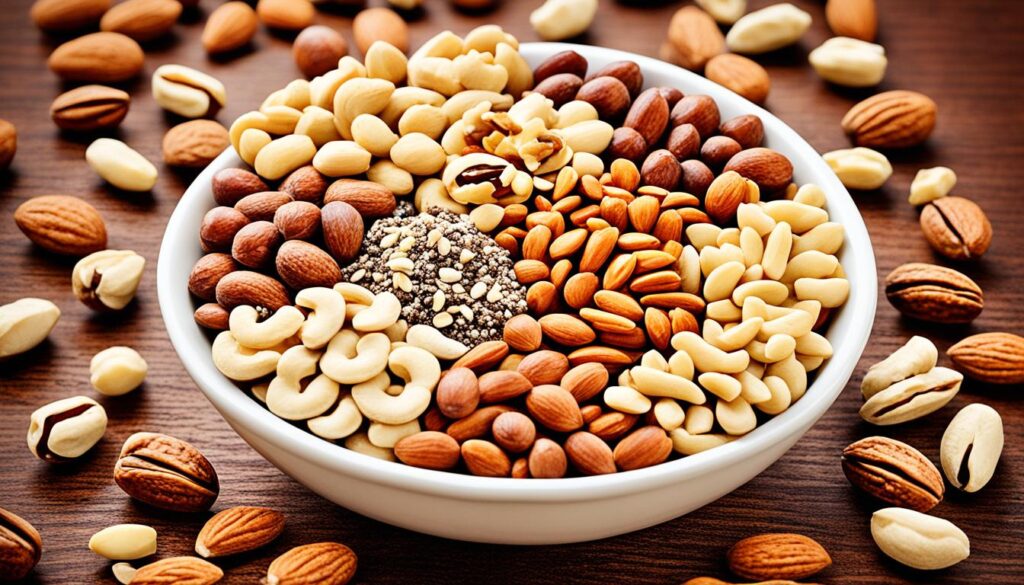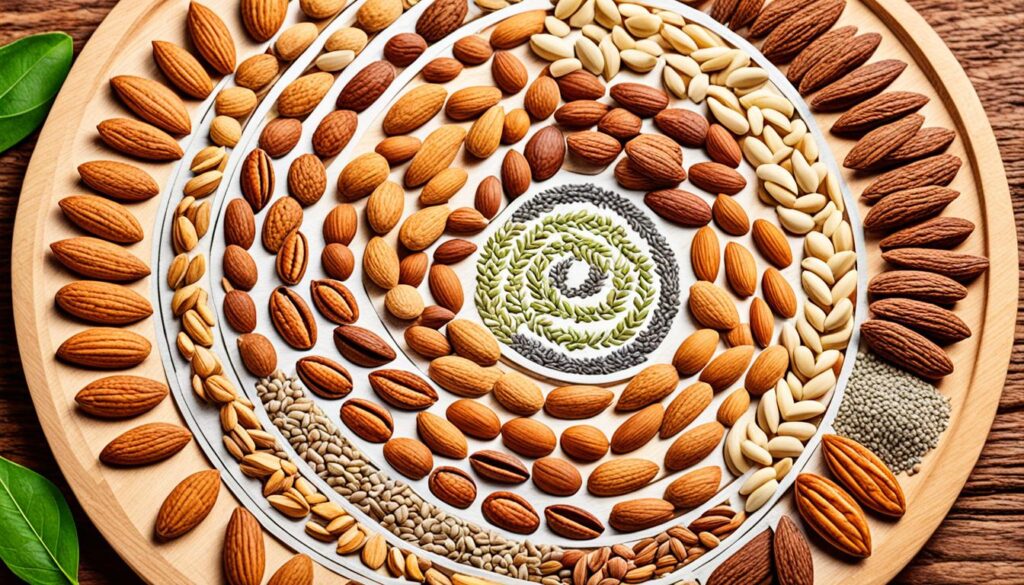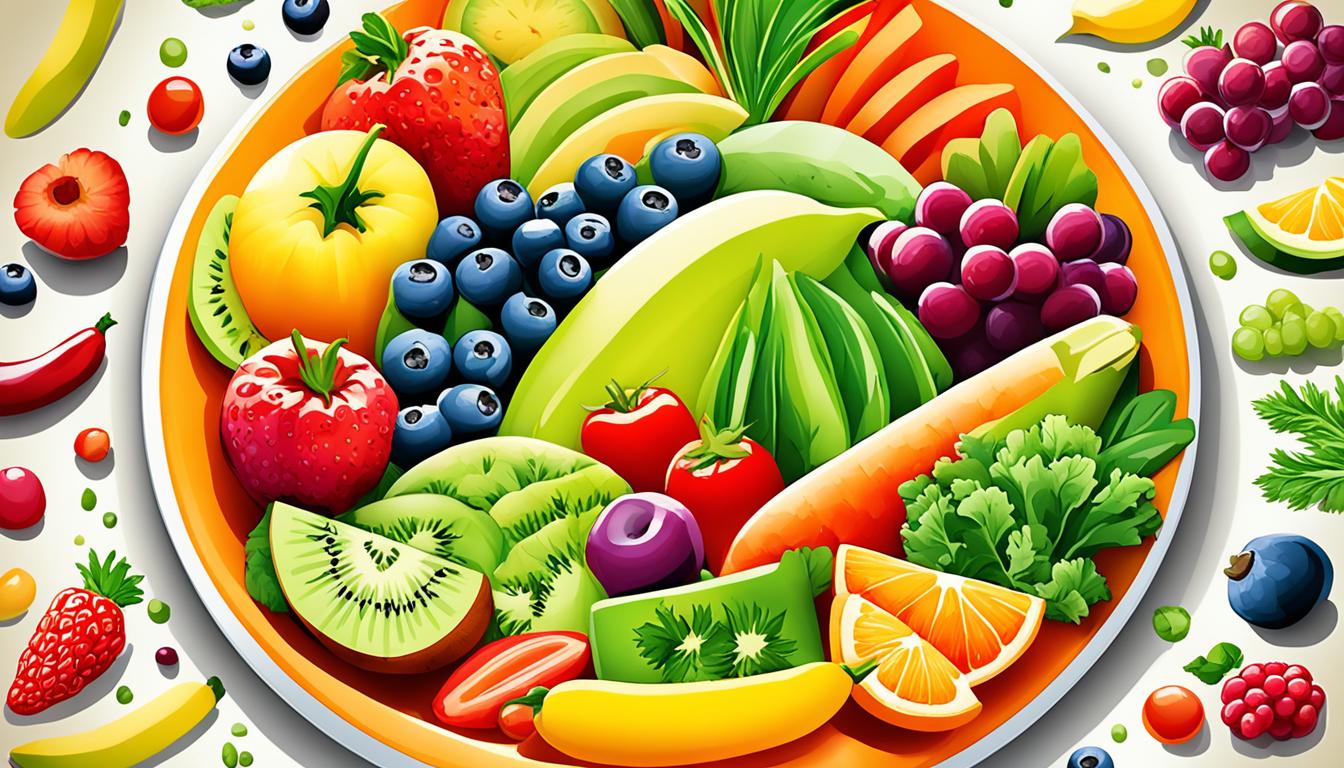Did you know that over 95 million Americans have high cholesterol, putting them at increased risk of heart disease and stroke?[1] If you’re one of them, it’s important to take control of your cholesterol levels and make dietary changes to promote heart health. Fortunately, there are specific foods that can help lower your cholesterol naturally, allowing you to improve your overall health and reduce your risk of cardiovascular problems.
Incorporating these cholesterol-lowering foods into your daily meals can have a significant impact on your cholesterol levels. From fiber-rich foods that reduce LDL cholesterol to omega-3 fatty acids that boost HDL cholesterol, there are various choices for maintaining a healthy cholesterol profile.
Key Takeaways:
- High cholesterol affects over 95 million Americans.
- Specific foods can help lower cholesterol naturally.
- Dietary changes can reduce the risk of heart disease and stroke.
- Fiber-rich foods, omega-3 fatty acids, and healthy fats are beneficial for cholesterol control.
- Incorporate these cholesterol-lowering foods into your daily diet for a healthier heart.
By making simple and delicious changes to your diet, you can take charge of your cholesterol levels and live your best life. Let’s explore the top foods that can naturally lower your cholesterol and enhance your overall well-being!
Disclaimer: This article is for informational purposes only and is not a substitute for professional medical advice.
[1]
Source: American Heart Association
Fiber-Rich Foods for Cholesterol Reduction
Foods high in soluble fiber play a crucial role in reducing LDL cholesterol, commonly known as “bad” cholesterol. By incorporating these nutrient-rich foods into your low-cholesterol meal plan, you can effectively lower your cholesterol levels naturally.
Here are some fiber-rich foods that you should consider adding to your diet:
- Oatmeal
- Oat bran
- Kidney beans
- Brussels sprouts
- Apples
- Pears
These fiber-rich foods work by reducing the absorption of cholesterol into your bloodstream and promoting its excretion through the stool. It’s recommended to consume three to four grams of soluble fiber per day to decrease LDL cholesterol levels.
Adding these fiber-rich foods to your daily meals, especially as part of a low-cholesterol meal plan, is an effective strategy for managing and reducing your cholesterol. By incorporating these foods into your diet, you can improve your cholesterol profile and support your overall heart health.
“Eating a diet rich in fiber can help lower cholesterol levels and reduce the risk of heart disease.” – American Heart Association
Omega-3 Fatty Acids for Heart Health
Fatty fish, like mackerel, herring, tuna, salmon, and trout, are high in omega-3 fatty acids, which can lower triglyceride levels and reduce the risk of heart disease. Omega-3 fatty acids do not directly affect LDL cholesterol levels but can increase HDL cholesterol, the good cholesterol.
Consuming at least two servings of fish per week can provide these heart-healthy benefits. Additionally, walnuts, flaxseed, and canola oil contain small amounts of omega-3 fatty acids and can be incorporated into your diet to further support heart health.

Other ways to incorporate omega-3 fatty acids into your diet:
- Add flaxseed to your cereal or yogurt in the morning.
- Sprinkle walnuts on top of salads or include them in homemade granola.
- Use canola oil when cooking instead of oils high in saturated or trans fats.
Incorporating these heart-healthy foods into your diet can help you maintain optimal cholesterol levels and support overall heart health.
Nutritious Nuts for Cholesterol Improvement
When it comes to improving your cholesterol levels, nuts are a tasty and nutritious option to consider. Almonds, walnuts, and other tree nuts are packed with healthy fats that can help lower blood cholesterol. Including nuts in your diet has been shown to have numerous benefits, including reducing total cholesterol, LDL cholesterol (the “bad” cholesterol), and triglycerides.
Studies have indicated that consuming just one handful of nuts per day can provide these cholesterol-lowering benefits. You can easily incorporate nuts into your meals by adding them to salads, scattering them over yogurt, or simply enjoying them as a snack.
Nuts are a versatile ingredient that can be part of cholesterol-friendly recipes, allowing you to explore delicious and healthy meal options. Whether you’re making a homemade trail mix or using crushed nuts as a breading for baked chicken, the possibilities are endless.
Make sure to choose unsalted or lightly salted varieties to keep your sodium intake in check. Raw or dry-roasted nuts are the best options, as they retain their natural goodness without added oils or preservatives.
“Nuts are a tasty and nutritious way to lower cholesterol levels and support heart health.”
Benefits of Nuts for Cholesterol Improvement
Nuts offer several key benefits when it comes to cholesterol improvement:
- Rich in Healthy Fats: Nuts are a great source of monounsaturated and polyunsaturated fats, which can help lower LDL cholesterol and reduce the risk of heart disease.
- High in Fiber: Nuts contain dietary fiber, which can help lower cholesterol levels by reducing the absorption of cholesterol from the digestive system into the bloodstream.
- Packed with Antioxidants: Nuts are rich in antioxidants, such as vitamin E, which can help prevent the oxidation of LDL cholesterol and reduce the risk of plaque buildup in the arteries.
Although nuts are beneficial for cholesterol improvement, moderation is key due to their high calorie content. Incorporate them as part of a balanced diet and be mindful of portion sizes.
| Nut | Cholesterol-Lowering Benefits |
|---|---|
| Almonds | Rich in monounsaturated fats and fiber, which can help reduce LDL cholesterol levels. |
| Walnuts | Contain omega-3 fatty acids and antioxidants that can improve lipid profiles and reduce inflammation. |
| Other tree nuts (e.g., pistachios, cashews) | Provide heart-healthy fats, fiber, and plant sterols that promote cholesterol reduction. |

Adding nuts to your diet is a simple and effective way to improve your cholesterol levels and support heart health. With their versatility, you can include them in a variety of cholesterol-friendly recipes and enjoy the delicious flavors they bring to your meals. So go ahead and grab a handful of nuts for a healthier heart!
Healthy Fats and Plant Sterols for Cholesterol Management
When it comes to managing your cholesterol levels, incorporating healthy fats and plant sterols into your diet can have a significant impact. Avocados, olive oil, and foods fortified with plant sterols or stanols are excellent additions to your cholesterol-friendly recipes.

Avocados are rich in monounsaturated fatty acids (MUFAs), which can help improve your HDL cholesterol levels, also known as “good” cholesterol. Including avocados in your meals not only adds a creamy texture but also provides heart-healthy benefits.
Olive oil, especially extra virgin olive oil, can be a great substitute for other fats in your cooking. It has been linked to a reduced risk of heart attacks and can contribute to a healthier cholesterol profile.
Foods fortified with plant sterols or stanols, such as margarines or orange juice, can also play a role in lowering LDL cholesterol, commonly known as “bad” cholesterol. These plant compounds help block the absorption of dietary cholesterol, reducing its impact on your blood cholesterol levels.
Incorporating Healthy Fats and Plant Sterols into Your Diet
Here are some ideas for including these heart-healthy ingredients in your cholesterol-friendly recipes:
- Use avocado as a spread on whole-grain toast or as a creamy addition to salads.
- Drizzle extra virgin olive oil over roasted vegetables or use it in homemade salad dressings.
- Enjoy a daily glass of fortified orange juice or incorporate it into smoothies.
- Spread margarine fortified with plant sterols on whole-grain crackers or bread.
By making these simple adjustments to your diet, you can support your cholesterol management efforts and promote heart health.
Conclusion
Lowering your cholesterol through diet is an important step towards living a heart-healthy life. By incorporating fiber-rich foods, omega-3 fatty acids, nuts, and healthy fats into your daily meals, you can naturally lower your cholesterol levels and reduce your risk of heart disease.
Creating a balanced and nutritious meal plan that includes these cholesterol-lowering foods will not only improve your cholesterol profile but also support your overall health and well-being. Remember, it’s never too late to take control of your cholesterol levels and live your best life with a heart-healthy diet.
Make sure to include foods such as oatmeal, kidney beans, fatty fish like salmon, walnuts, avocados, and olive oil in your daily meals. These foods are not only delicious but also offer powerful benefits for cholesterol control and heart health.
So why wait? Start making small changes to your diet today and prioritize a heart-healthy lifestyle. With the right food choices, you can take charge of your health and enjoy a better quality of life. Live your best life by embracing a heart-healthy diet and keeping cholesterol under control.






